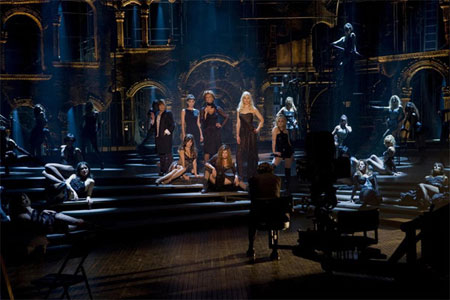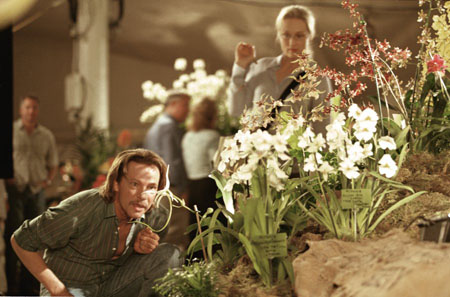DIRECTED BY: Rob Marshall
FEATURING: Daniel Day-Lewis, Stacy Ferguson (“Fergie”), Penélope Cruz, Marion Cotillard, Judi Dench, Sophia Loren
PLOT: Celebrity director Guido Contini finds he can’t get started on his latest movie script because the women he’s romantically entangled with keep bursting into song whenever he’s around.

WHY IT WON’T MAKE THE LIST: Musicals, by their very nature, are a little weird, because in everyday life people very rarely ask you for the time in the key of A-flat minor. The musical genre traditionally atones for the sin of departing from reality by doubling over backwards to be reassuringly conventional in narrative and thoughtlessly blithe in message. Nine is no exception to the general rule; we only cover it here because it was inspired loosely by the great weird film 8 1/2 and it’s fascinating director, Federico Fellini.
COMMENTS: First things first: Nine, while inspired by Fellini’s 8 1/2, is obviously aimed at those who never saw the original film, or who saw it but didn’t like it much. Keeping that in mind off the bat makes the film feel much less like an insult to the maestro’s memory, and much more like what it is: a highly fictionalized puff piece that aims solely to entertain, while presenting the artist’s struggle to create as just another two-dimensional backdrop for the song-and-dance spectaculars. Except that these songs and dances are not really spectacular, so much as acceptable. The tableaux—which range from minimalist tinker-toy girders to a sequined Folies Bergère nightclub to a fashion runway strobe-lit by paparazzi flashes (the irony!)—are all flashy, pretty and eye-catching enough. The problem is that it would be, for the most part, an act of charity to describe the melodies as memorable, so that most of the numbers come across as all sparkle and no spark. The one exception is provided by Stacy Ferguson (better known as Fergie). Putting the only professional singer in the cast together with the movie’s only hummable melody (“Be Italian”) is an eggs-in-all-one-basket strategy that gives audiences something to remember, but also highlights the mediocrity of the rest of the musical performances.
As for the rest of the star-studded female cast, none can really sing or dance, and there is an unrelenting sameness to their lyrics (which are mostly about how each dame would rather be sleeping with Daniel Day-Lewis than doing whatever she’s doing now). At some point the musical numbers become numbing interruptions that make the melodrama interesting by comparison. Day-Lewis’ Italian accent is passable and he does invest his Guido with a charming childlike quality that almost makes his irresistibility to women believable; but, though he’s game enough, he just can’t carry a tune, and having him half-sing/half-talk through the climactic songs is no solution. Still, the razzle-dazzle of the production numbers, numerous cameos (i.e., Sophia Loren) and Fellini references, Fergie’s musical triumph, and a vampy song by Cruz—whose lingerie-clad tramp around a mirrored floor while wrapping pink ropes around her willowy frame is sultry enough to make her song and dance talents irrelevant—are enough to transform Nine into passable, if forgettable, entertainment. Plus, it features more corsets and fishnet stockings per minute than you’ll see outside of a fetish video, which can hardly be considered a bad thing.
Nine isn’t really inspired so much by 8 1/2 as it’s inspired by the most famous scene of 8 1/2, the harem/lion tamer sequence, where Guido famously envisions himself as being adored, then harried, by the various females in his life. The fact that the movie’s psychology ignores all other aspects of the director’s creativity and inner artistic torments in favor of the reductionist “it’s all because he’s conflicted about his unrealistic image of women” is disappointing, but hardly surprising considering this is squarely middlebrow Hollywood stuff. After all, what else would you expect from a movie whose title announces its intentions by rounding up an inconveniently weird partial number to a nice, easily digestible integer?
WHAT THE CRITICS SAY:






